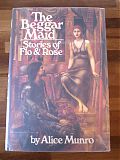
Alice Munro
The Beggar Maid
Stories of Flo and Rose
I spent the later end of yesterday reading The Paris Review’s interview with Alice Munro. Her responses paint her as a modest writer happily tucked away in rural Ontario, where she returned after a twenty year stint in British Columbia. Whenever I read a story by Alice Munro I am driven to a curiosity in what kind of woman she is to write the stories she has. I’ve imagined her as either very eccentric or as someone very “normal.” I’m not sure why I picture these two extremes because her interview points that she is neither; a quick, sharp woman with a keen eye for personalities and details.
The interview was the second time I read Munro saying, “Writing is the only thing I can do.” When she was quite young she had her first daughter and the second not long after, and she wrote a lot and persistently. Perhaps I thought the interview would give me some clue to the trick or catch behind her stories. Maybe her isolation from other writers has something to do with the clarity of her voice. But besides that, the only trick I found was the same I always find, work and more work.
The Beggar Maid is another collection of short stories, but with a twist: Rose is the continuous character and to a lesser extent, so is Flo. The stories follow Rose’s life chronologically with the usual Munroian anachronistic twists. We know Rose will leave her husband Patrick before she does. But the reader is never provided with the dramatics of these big scenes, instead we are given the situations leading up to them and those leading away, whether far in the past or future. And even these are never tied and sweet explanations. And it is exactly this, this leading up to and away to what, we hardly know, that makes Munro’s stories so brilliant.
The two stories that were the strongest to me were Providence and Simon’s Luck. And in a way they are about similar points in Rose’s life where hope is given then taken away. I found Simon’s Luck especially poignant, when she is driving across Canada to simply get away from feelings of rejections and even when she has conquered this, keeps on driving. There are long paragraphs of Rose’s inner-life and as I was reading I felt I knew her as best I could.
…the surprise was that she so much wanted, required, everything to be there for her, thick and plain as ice cream dishes, so that it seemed to her it might not be the disappointment, the losses, the dissolution, she had been running from, any more than the opposite of those things: the celebration and shock of love, the dazzling alteration.
But I also had more questions: Rose is middle-aged, has she reached that point or was she always unwilling to alter herself for love?
The Flo of the subtitle is Rose’s step-mother, a hardened rural woman who doesn’t seem to have much love herself. Though Flo’s actual scenes in the book are few, there is a general overall feeling, that though she’s not physically present, she’s always there, acting as Rose’s counter. Flo is a woman who as equally someone for Rose to go up against as she is part of Rose’s definition.
The last story of the book, Who Do You Think You Are? kind of confused me at first for its purpose and placement. The connection seemed dubious, or that it was partly misplaced. But once I was done it made sense, even if it didn’t provide much of an ending. Maybe, because The Beggar Maid is a collection of short stories there can be no ending like in a novel, as a story only requires it finishes itself. Who Do You Think You Are? brought up more questions that might be answered if I were to read the book again.
Alice Munro is growing on me the more I read her stories. Lucky for me, there are so many of her short stories out there for me to read!
Commentary for The Beggar Maid
Thanks Helen for the recommendation. It’s always sad when a writer isn’t translated more widely, but there are lots of great small publishing houses that are bringing other countries’ writers into English. Maybe Rubina will soon be one of them as it sounds like she deserves to be read if she compares to Munro.
· · · · · · · · · · · · · · · · · · · ·
1 On Monday 14 October 2013 helen wrote:
However, today’s best short stories are once again written in Russian. Sadly, not many scholars can read them. The name of the writer is Dina Rubina.